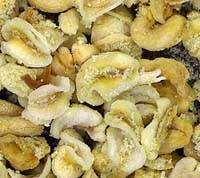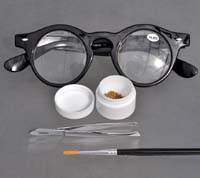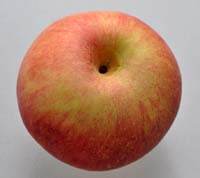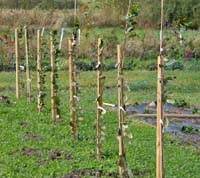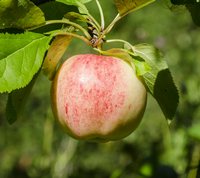|
|
Growing apple trees from seeds
|
Every seeds in an apple has its own unique combination of chromosomes. If you have the courage to make your own apple variety, you can plant an apple seed and wait for it to become a tree that gives apples. The probability of creating a new good variety is small, but the old apple varieties we know are caused by apple seeds have germinated and become new apple cultivars.
You can increase the chance of creating a good apple variety by trying to controll the properties the new apple cultivar should have. This is done by selecting both the mother and the father of the variety, and make a cross-pollination.A cross-pollination is the act of transferring pollen grains from the male anther of a flower from the father varity to the female stigma of a flower from the female varity. To ensure that insects do not pollinate the flower before your are trying, select flowers at balloon stage. This is the stage just before the flower pops out. Remove the petals, sepals, and stamens, so there is nothing to attract pollinators.
Remaining are the pistil. Pistil is the flower's female reproductive organs with the stigma on top, and the ovary at the bottom. The collected pollen from the male anther is transferred to the female stigma. This can be done by means of a water color paint brush or cotton swab.
|
|
|
|
Bunch of apple blossoms. The 3 flowers are in balloon stage and is suitable for cross-pollination. |
| |
|
 |
The interior of a red appleflower. You can see stigma, anther, petal and sepal. |
| |
|
 |
Apple blossoms at balloon stage are collected. Anthers are peeled off with tweezer. |
| |
|
|
After drying a few days, anthers open and release pollen. It may help to crush the anthers with the back of a pencil. |
| |
|
|
Cross pollination of apple flower. Petals, sepals and stamens are removed from the flower. This leaves the pistil's with ovary and stigma. (The female parts). There is nothing to attract insects. Now is the time to transfer pollen to stigma. |
| |
|
 |
Macro photo of stigma from apple flower. Pollen grains will get stuck here. |
| |
|
|
Tools for cross pollination of apples. Tools I use when apple blossoms must be pollinated. |
|
|
|
If pollination is successful, apples develops. When the apples are ripe, take out the seeds. Apple seeds must be stratified before they germinate. You are breaking the apple seeds dormancy by exposing them to cold for approx. 3 months. The safest way is to put the seeds in moist sand in a container in the refrigerator. After approx. three months they are beginning to sprout. They are planted in pots. By good care eg. in a greenhouse until the fall, the new trees reach a height of 1.5 m to 1.8 m, before they are planted out a suitable place. |
|
One of My cross pollinated apples. The apples, where the sepals are removed at an early stage, are easy to recognize. |
| |
|
|
Apple seeds for new apple varieties are treated this way. Take the apple seeds directly from the apple, and place them in moist sand in a closed container, and place them in a refrigerator for about 3 months. Here we have used a honey cup. Write the Information on the cup with a permanent marker. |
| |
|
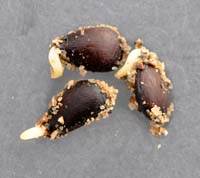 |
Germinated apple seeds. After approx. 3 months, at a temperature below 5 degrees, dormancy are broken. |
| |
|
 |
Germinated apple seeds planted in a pot. Before the small plants become too large, they are planted in containers, one plant in one container. |
| |
|
|
Apple trees from seed planted in the autumn September 2008. |
| |
|
 |
One of my own developed apple. The first apples harvested in 2012 from apple seed planted 2008. Cross between Discovery and a danish apple named Ondrup Summer apple. |
|
|
|
Another of my own developed apples. Cross between RedFree and a danish apple named Ondrup Summer apple. |
| |
|
|
| |
|
|
| E-book |
Grafting of apple trees |
|
step by step |
|
|






